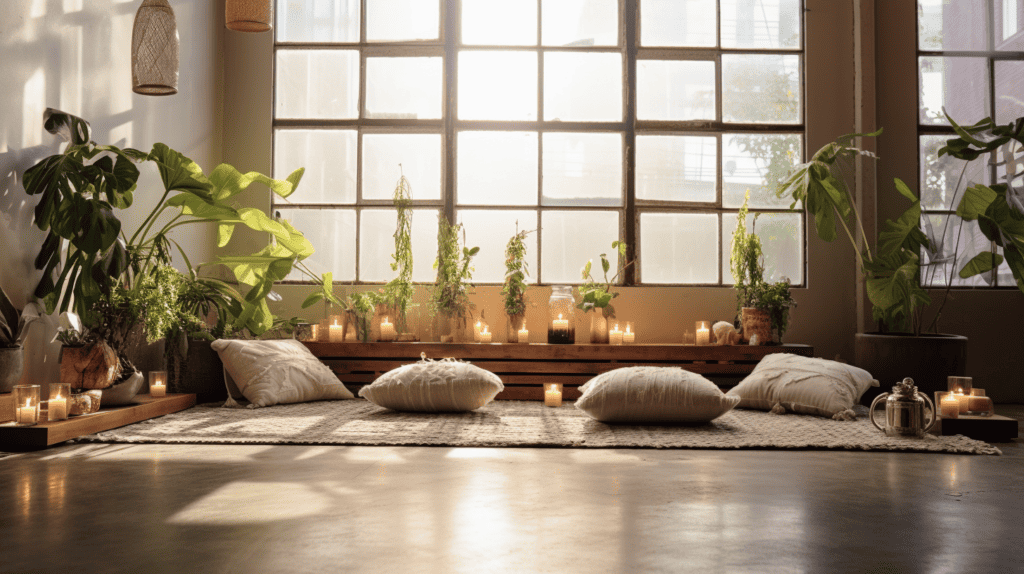Meditation is an ancient practice that has become increasingly popular as more people discover its benefits for mental and physical health. However, some people find that anxiety after meditation, at least initially, is worse. If you experience anxiety during meditation or resist meditating due to anxiety, there are ways to make meditation work for you.
Key Takeaways
- Anxiety during meditation is common but temporary. Persist, and it will subside.
- Mindfulness helps reduce anxiety by anchoring you in the calming present moment.
- Note anxious thoughts non-judgmentally as passing mental phenomena.
- Cultivate self-compassion and patience for the ups and downs.
- Meditation builds resilience and stability to weather life’s storms.
Causes of Meditation-Induced Anxiety
Sitting still and focusing inward can be uncomfortable at first. Meditation heightens awareness of thoughts, emotions, and physical sensations. For those prone to anxiety, this amplified internal focus may worsen symptoms like rumination, muscle tension, and breathlessness associated with anxiety disorders.
Some types of meditation involve observing your thoughts non-judgmentally. For people with anxiety, thoughts often focus on worst-case scenarios. Meditation can bring these worried thoughts to the surface initially. Remind yourself this is temporary and that the practice of meditation helps quiet the mind over time.
Verywell Mind mentions that initially, practicing meditation can heighten feelings of anxiety or self-judgment.
Research shows some people experience anxiety during meditation, especially those with pre-existing anxiety or depression. One study found that 12% of regular meditators reported worsening depression or anxiety from meditation. However, many persisted and found relief. Trust that any unpleasant sensations that arise will pass.
TIP: Start with shorter meditation sessions, even 5-10 minutes daily. This prevents anxiety from building up too strongly. Slowly increase the session length as you become more comfortable.
Managing Anxiety During Meditation
When anxiety surfaces during meditation, there are tools you can use to relax and refocus:
- Notice physical signs of anxiety like tense muscles, clenched jaw, or shallow breathing. Do a quick body scan to release tension and take some deep breaths.
- Label anxious thoughts and let them go. Say “worry thought” or “planning thought” and return to your mantra or breath.
- Visualize anxiety as a wave and imagine it washing over you and drifting away.
- Repeat calming phrases like “this too shall pass” to embrace transient anxiety.
- Place a hand on your heart to soothe yourself with a gentle touch.
- Remember, anxiety is common and does not mean you can’t meditate. Over time, you’ll relate to it differently.
TIP: Playing calming music or using a guided meditation can help ease anxiety initially. Focus on the guide’s voice instead of your thoughts.
Anxiety After Meditation and Mental Health

Some people experience increased anxiety or other adverse mental health effects from meditation. This seems counterintuitive, given meditation’s reputation for reducing stress and promoting relaxation. However, specific individuals may be vulnerable to adverse effects. Research indicates that around 8-25% of regular meditators have “unwanted experiences” like panic attacks, anxiety, depression, or dissociation. This may be more common in people with pre-existing mental health conditions. Those with severe untreated anxiety or trauma appear most susceptible.
Possible reasons for “relaxation-induced anxiety” include:
- Fear of losing control when thoughts/emotions arise during meditation
- Dread of returning to baseline anxiety after a relaxed state
- Surfacing of traumatic memories or sensations
- Over-focusing on physical symptoms like heartbeat
However, with proper support and adjustments to their practice, most people can benefit from meditation. Some tips include:
- Trying brief, guided meditations to start
- Avoiding forced meditation when not in the right headspace
- Focusing on external sensations vs. internal ones
- Seeking therapy and other treatment along with meditation
With realistic expectations and compassionate troubleshooting, meditation can still help manage anxiety and other mental health conditions for most people. But it should not replace professional treatment of severe issues. Monitoring your reactions and getting support is critical.
Overcoming Resistance to Meditate Due to Anxiety
If you avoid meditation because it makes you anxious, there are ways to get beyond this resistance:
- Start with just 1-2 minutes. Sitting with anxiety briefly can help desensitize you to it.
- Focus on your breath first before observing thoughts. This builds concentration skills.
- Choose mindfulness meditation over open monitoring styles, which invite wandering thoughts.
- Adjust posture if tense. Lying down with support under the knees reduces anxiety.
- Affirm to yourself, “Whatever arises during meditation, I have the resources to handle it.”
- Remember that with regular practice, meditation relieves anxiety long-term, even if symptoms initially worsen.
- Consider therapy to address thought patterns underlying anxiety. Meditation and therapy together can provide relief.
TIP: If anxiety feels truly unmanageable during meditation, stand up and shake it off. Then, try a different grounding strategy, like mindful walking.
Mindfulness for Anxiety Relief
Mindfulness meditation reduces anxiety and worries during practice and daily life. By continually returning your attention to the present moment, you break out of anxious thought loops about the past and future.
Focus on sensations happening right now – sights, sounds, breath feeling. Notice when your mind wanders and gently bring it back. Thoughts lose their grip when you anchor to the present.
Studies show regular mindfulness meditation shrinks the amygdala, the brain’s emotional center, and activates the prefrontal cortex linked to calm decision-making. This leads to less reactivity and more rational thinking under stress.
Mental Health Daily observes that various types of meditation may slow brain waves in certain regions, potentially leading to increased depression or anxiety, along with a sense of depersonalization or feeling unlike your normal self.
Mindfulness also helps you recognize anxious thoughts as mental events rather than truth. We have thousands of thoughts daily and don’t have to believe them all. Watch them arise and pass without judgment.
TIP: Download a mindfulness app like Headspace or Calm. Use the guided sessions anywhere anxiety strikes – from traffic jams to doctor’s waiting rooms.
Help Fight Anxiety after Meditation With Yogo
Yoga can be an excellent complementary practice for those who experience anxiety or resistance when meditating. The physical postures and breathwork of yoga help release tension and bring awareness to the body, which can prepare the mind for meditation. Some ways yoga can help ease meditation anxiety include:
- Yoga poses releases muscle tension and promotes relaxation. Relieving physical tightness can relieve associated mental tension and resistance.
- Pranayama breathing exercises help calm the nervous system. Long exhales trigger the relaxation response, making it easier to focus during meditation.
- Yoga increases body awareness. Tuning into physical sensations gets you out of your busy mind and into the present moment.
- Sequencing yoga before meditation transitions the mind from active to receptive. The physical stimulation of yoga gives way to stillness.
- Yoga builds concentration. The focus required for poses lays the groundwork for maintaining focus during meditation.
- Yoga cultivates non-judgement. On the mat, we practice observing experiences without reacting to them negatively. This mindset is essential for meditation.
Starting a meditation practice when anxious or resistant can be challenging. Adding yoga to your routine can ease the transition and set you up for a calmer, more focused meditation session. A few sun salutations or other simple flowing sequences before meditating can make a big difference.
Creating Space Between Yourself and Anxiety

Meditation teaches you to observe anxieties in a calm space rather than being immersed in them. This “witness perspective” lets you respond more skillfully.
Imagine sitting on the bank of a river, watching thoughts and emotions float like leaves on the water. You don’t have to grab them or follow where they lead. Just notice each one, then let it pass.
When anxiety feels overwhelming, pause and feel your feet on the floor or the air moving through your nose. This brings you out of the anxious storyline into the present moment’s reality.
Remember that thoughts and feelings come and go. They don’t define who you are at your core. You are the spacious awareness holding each experience as it arises.
TIP: Place a hand on your heart and repeat soothing phrases like “I’m here” and “I’m OK.” Feel your intrinsic calm beneath the turbulence of anxiety.
Transforming Your Relationship with Anxiety
Relating differently to anxiety is vital for those who struggle with chronic worry and panic. Meditation allows you to cultivate courage, compassion, and wisdom around your anxious patterns.
Bring self-acceptance to anxious thoughts rather than suppressing or judging them. Notice how they arise due to causes and conditions, not because something is inherently wrong with you. Your anxiety is not who you are.
#mindfulness, #meditation
— Daily Meditation Reader 📚 (@DailyZenReader) November 15, 2023
"When you walk, arrive with every step. That is walking meditation." — Thich Nhat Hanh
Read more ↘︎https://t.co/0ayzJTCldp
Investigate any unhelpful stories you believe about anxiety, like “it’s too much to handle” or “I’m defective.” Question if they are true. Replace limiting narratives with empowering ones.
See anxiety as a messenger about what you need to take care of – maybe more rest, exercise or connection. Listen to its prompts with care, then act from your highest intentions, not fear.
TIP: Write a letter to your anxiety with understanding and resolve. Thank it for trying to protect you, but set boundaries around how much it controls your life.
Understanding the Role of the Parasympathetic Nervous System
The parasympathetic nervous system, sometimes called the “rest and digest” system, plays a crucial role in managing anxiety during meditation. This branch of the autonomic nervous system calms the body and mind when activated.
Meditation techniques like focused breathing, body scans, and mantras stimulate the vagus nerve, which controls parasympathetic response. This lowers heart rate, blood pressure, and stress hormones that heighten anxiety.
New Scientist notes that mindfulness and meditation, while generally seen as stress-relievers, can sometimes exacerbate depression and anxiety.
Meditation provides a break from anxious arousal by tapping into rest and digesting physiology for even brief periods. The more you activate this relaxation response through practice, the more your baseline nervous system tone shifts.
Remember that our bodies have inherent self-soothing wisdom. Tune into the parasympathetic by slowing down, soothing your senses, relaxing your belly, and focusing inward.
TIP: Try meditating after meals when the parasympathetic system is naturally activated. This can be an optimal time for beginners prone to meditation anxiety.
Learning to Relate Differently to Anxious Thoughts
When we get caught up in anxious thoughts, it’s easy to let them snowball, as they trigger more worrying thoughts in a vicious cycle. Meditation helps break this rumination pattern.
Practice noticing thoughts from a neutral standpoint without needing to evaluate, cling to or push away their content. See them as mental formations arising and passing due to myriad causes.
Label recurring thoughts like “worry” or “planning” without following where they lead. Say hello and goodbye as you gently return to the present. This stops anxious ideation from taking root.
Accept that worrying thoughts will keep coming back – it’s their nature. Relate to them as old habits unwinding. Maintain a commitment to meditation and trust its power to transform your mind over time.
TIP: Write down repetitive anxious thoughts during meditation. Putting them on paper releases their grip and builds insight into your mind.
Using Meditation to Expand Perspective
Anxiety often comes from a rigid, limited perspective. We get attached to stories about how things “should” be rather than seeing the bigger picture. Meditation expands your viewpoint in several key ways.
Observing your thoughts and emotions without reacting lets you understand which life events typically trigger anxiety for you. You become able to catch complex states earlier and respond skillfully.
Repeating a calming mantra like “this too shall pass” helps you remember anxiety is transient even though, at the moment, it can feel permanent and overwhelming.
Over time, meditation strengthens qualities like wisdom, patience, non-reactivity, and discernment. You naturally relate to anxiety with more space and compassion.
TIP: When anxious, visualize your issue from the wise, calm perspective you will have six months or a year from now. How will it appear less worrisome?
Practicing Self-Compassion and Patience
Many who struggle with anxiety are highly self-critical. Meditation helps develop a kinder attitude, which makes anxiety much more manageable.
Notice anxious thoughts with curiosity and non-judgment. Anxiety is a normal human experience, not a personal failure. Respond as you would to a good friend feeling anxious.
Remember that meditation is a process. Some days will be easier than others. Meet yourself where you’re at with compassion rather than frustration.
Trust that your practice will blossom when the time is right. Stay committed while cultivating patience, self-acceptance, and lightness along the way.
TIP: Place a hand gently on your heart while repeating calming mantras like “I accept where I am right now” and “May I be peaceful.”
Letting Go of Control
Much anxiety comes from believing we can control life’s uncertainties and prevent bad things from happening. Meditation helps ease our grip.
Notice how trying to micromanage your experiences creates tension. See how thoughts arise spontaneously without your direction. Open to the universe’s wisdom.
Practice accepting emotions, thoughts, and situations as they unfold instead of resisting them. Allow reality to move at its own pace rather than forcing outcomes.
Remember, you only have agency in the present. Let future planning emerge from mindfulness rather than anxiety about what might happen.
TIP: Visualize yourself as a leaf floating down a stream, surrendering to the water’s flow. This awareness loosens the need for control.
Being Present in the Moment
Anxiety often fixates on the past or the future, while the present moment is always accessible for calm. Meditation returns us there.
Focus intently on your immediate surroundings using all your senses – notice colors, sounds, scents, and textures happening right now. This pulls you out of abstract worry.
Try a sensory grounding exercise to reduce anxiety – run your hands under cold water, squeeze a stress ball, listen to ambient sounds around you, and sniff fresh flowers.
When emotions intensify, pause and breathe consciously for 60 seconds. Say, “I’m here, right now,” silently with each inhalation and exhalation.
TIP: Carry a small object like a pebble in your pocket. Touch it periodically to redirect your attention to the present. This disrupts anxious thoughts.
Noticing and Acknowledging Thoughts Non-Judgmentally
Trying to suppress anxious thoughts often backfires and gives them more power. Meditation takes a different approach.
Note when repetitive thinking or scenarios arise. Label them neutrally without self-criticism or exaggerated concern.
Imagine thoughts as leaves drifting along a stream or clouds passing through the sky. Allow them to keep moving without clinging or pushing away.
It’s natural for the mind to produce thoughts related to perceived threats. This is the mind’s act of trying to protect us. Refrain from judging it.
Observe ruminations with detached interest, then deliberately return focus to your anchor – the breath, a mantra, or sensory experience.
TIP: Write repetitive thoughts on slips of paper and place them in a box. This symbolizes releasing their hold over you.
Redirecting Attention Back to the Breath
Inevitably, in meditation, your mind will wander incredibly when anxious. Gently guiding it back is vital.
Note periods when you “wake up” and realize you’ve been caught in a daydream or train of thought. Take mental notes without self-judgment.
Pause and feel the sensations of a few mindful breaths: cool air entering nostrils, ribs expanding, warm air leaving. This returns you to the moment.
Refresh your motivation by remembering the benefits of meditating with anxiety. Breathe with purpose, redirected toward your intention.
If loud thoughts pull you away repeatedly, try counting breaths from 1 to 10, then starting again. This keeps focus steady.
TIP: Say “thinking” in your mind when caught in rumination and “breathing” when concentration wavers. This reminds you of your purpose.
Using Meditation as Mental Training for Real-World Stressors
While meditation induces relaxation, its greater purpose is building mental skills to stay calm under real-life pressures.
When you get distracted many times but keep bringing your concentration back, you’re training your mind to return to equilibrium despite turmoil. This develops “stress resilience.”
Approach meditation as a mental boot camp. Just as athletes build muscles at the gym, you strengthen neural pathways for non-reactivity, discernment, and poise.
Trust that the effort you put forth in cultivating calm during meditation will serve you well in moments of natural anxiety. Your mind will become your refuge.
Stay motivated by remembering meditation is mental training for maintaining a wise perspective when it matters most – during future challenges.
TIP: When you feel anxious during the day, pause to meditate briefly. Practice your training by observing the anxiety without reacting to it.
Conclusion
For those prone to anxiety, meditation can seem intimidating at first. Sitting with discomfort runs counter to our instinct to avoid sources of stress. However, with the right approach, meditation becomes a powerful way to reduce anxiety and worry both during practice and in daily living. Start slowly, be consistent, and don’t judge yourself on “good” or “bad” sessions. Your effort will pay off as meditation rewires your mind for serenity. Trust the process and lean into the parts of meditation that soothe you, like breathwork, body scans or peaceful mantras. Anxiety becomes much more manageable when we relate skillfully to it. Meditation gives us the mental training to respond from peace rather than panic. Committing to daily practice, you’ll move toward more excellent stability and find your place of stillness.
FAQ on Anxiety After Meditation
Q: Can meditation and mindfulness practice worsen an existing anxiety disorder?
A: In some cases, meditation may cause or intensify feelings of anxiety or even trigger a panic attack, particularly if a person struggles with PTSD or severe anxiety. However, studies also show many people experience substantial benefits from meditation, including reductions in depression and anxiety. It’s important to note that these experiences can vary greatly among individuals and depend on the type of meditation practiced.
Q: What does a recent study show regarding meditation and anxiety?
A: A study showed that about 12 people who try meditation experience an unwanted negative effect, usually a worsening in depression or anxiety. The study is important as it’s considered the first systematic review of negative side effects associated with meditation and mindfulness training.
Q: Can the onset of a panic attack happen during a meditation session?
A: Yes, those with predispositions to anxiety disorders may experience intensified symptoms, including the onset of a panic attack during a meditation session. This is especially true if they delve into deep emotional conditions for the first time during their practice.
Q: Is any particular kind of meditation likely to increase anxiety?
A: While there are many types of meditation, no specific kind has been conclusively linked to increased anxiety. However, individuals going through a tough emotional phase may find certain mindfulness practices, such as focusing on stressful thoughts, could potentially trigger strong anxiety.
Q: When practicing meditation and mindfulness, is it common for regular meditators to experience severe anxiety?
A: While meditation is known to cause discomfort or distress in some practitioners, this is relatively rare. It’s believed that a small subset of regular meditators who have pre-existing anxiety conditions might experience severe anxiety during their mindfulness practice.
Q: What is the recommendation if I’m going to take up meditation but have experienced panic attacks in the past?
A: If you’re dealing with a history of panic attacks, it’s advisable to start meditation under the guidance of a qualified professional. They can provide support and modify the practice to better suit your needs. This way, you can experience the benefits of meditation while mitigating potential risks.
Q: Can meditators use a mantra to cope with anxiety during meditation?
A: Using a positive, affirming mantra can be an effective way for meditators to manage anxiety during their practice. A mantra can serve as a grounding device that brings the focus back when anxiety starts creeping in.
Q: Is giving meditation a try worth it if I have a history of anxiety?
A: Yes, despite the potential for heightened anxiety, many individuals with a history of anxiety find significant relief from consistent meditative practice. However, it’s always advisable to start meditation under professional guidance if you are concerned about your reaction to it.
Q: What does it feel like when meditation induces anxiety?
A: Some describe it as a heightened state of self-awareness. “It’s like shining a spotlight on your innermost thoughts and feelings, which may trigger anxiety in individuals prone to such conditions,” is a common analogy used. However, with practice and guidance, many learn to navigate these feelings effectively.
Q: Can meditation cause PTSD?
A: There’s no evidence that meditation can cause post-traumatic stress disorder (PTSD). However, some individuals with pre-existing PTSD might find meditation challenging as heightened self-reflection can lead to discomfort. Therefore, it’s recommended to practice meditation and mindfulness under supervision if you have a history of PTSD.





Leave a Reply